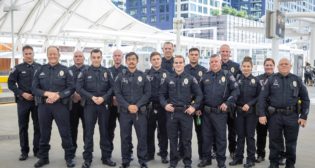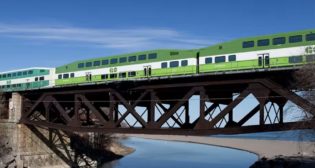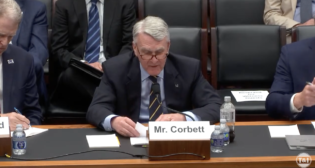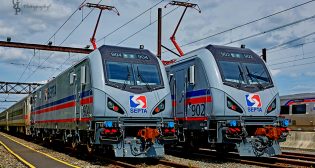
FTA Awards Grants to Help Transit Tackle COVID-19
Written by Marybeth Luczak, Executive EditorThe Federal Transit Administration (FTA) is distributing $15.8 million to 37 transit projects through its new Public Transportation COVID-19 Research Demonstration Grant Program.
Announced in October, the program was created following transit agency requests that FTA support research addressing COVID-19-related operational challenges.
The 37 selected projects will implement new cleaning and disinfecting protocols; contactless payment systems; data collection and reporting on ridership, vehicle capacity and other factors; and other solutions to improve agency decision-making and transparency and to increase rider confidence, according to FTA.
Among the rail-related projects receiving grants:
• City of Portland, Ore.: $439,950, to improve confidence in public transportation by replacing Portland Streetcars’ cloth seat coverings with “easy-to-sanitize” vinyl; educating riders with new message boards at stops; and hiring public health-trained staff to ensure vehicles are sanitized properly and the system adheres to public health guidelines.
• Connecticut Department of Transportation: $450,000 to conduct a pilot that includes testing of contactless, voice-activated ticket vending machines for seven CTrail Shoreline East (SLE) commuter rail stations.
• King County Metro, Wash.: $400,000 to distribute subsidized, contactless mobile transit tickets to riders through local businesses, hospitals and community-based organizations. The project will “test and document transit validation tools, fare incentive programs and best practices for including businesses in extending transit subsidies to riders.”
• New Jersey Transit: $600,000 to use video analytics and artificial intelligence “to address COVID-19 exposures on transit vehicles via heat mapping, face mask detection and capacity management.” The pilot will be conducted on the River LINE.
• New York Metropolitan Transportation Authority (MTA): $600,000 to examine “how people move and how COVID-19 travels throughout the metropolitan region by studying aerosol dispersion in transit.”
• San Francisco Municipal Transportation Agency (SFMTA): $450,000 to develop a customer information system—including customer profiles and service planning and ridership projection models—“to identify mobility needs, target market segments and develop messaging to drive up ridership.” Messaging includes targeted media outreach and information campaigns to rebuild public confidence.
• Southeastern Pennsylvania Transportation Authority (SEPTA), in partnership with Drexel University: $584,618 to evaluate air ventilation and surface cleaning in preventing COVID-19 transmission.
• Utah Transit Authority (UTA): $247,500 to expand its contactless payment software to include e-vouchers, which will allow contactless payments with UTA mobile fares and transportation network companies. The project will also add a rider web portal and mobile app for trip planning.
• Virginia Department of Rail and Public Transportation (DRPT): $247,500 to develop a COVID-19 Transit Recovery Toolkit, including “a comprehensive strategy handbook covering facility sanitation, exposure mitigation, contactless fare payments, policies for employee and passenger safety, long-term sanitation strategies, increasing service frequencies, reducing vehicle capacity, implementing multi-door boarding, and adopting longer term zero-fare policies to help transit agencies statewide, particularly those in rural areas.”
• Washington Metropolitan Area Transit Authority (WMATA): $600,000 to test and evaluate the effectiveness of enhanced air filtration and purification technologies on its subway cars.
FTA reported that it received 104 eligible proposals totaling some $63 million in funding requests from 36 states and territories.


